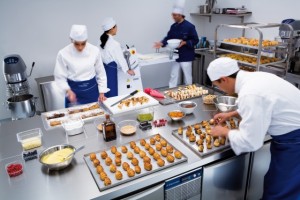 When (DMA) is retained to conduct a Chef Search, we always try to find the reason why the Club is looking for a new Chef. If the Chef is being terminated, what is the reason? We have heard every reason imaginable but overall, the number one reason we hear most is the “ala carte operation is inconsistent and food takes too long to get out of the kitchen.” The delivery of a quality product on a consistent basis is the most common challenge facing club food service operations today.
When (DMA) is retained to conduct a Chef Search, we always try to find the reason why the Club is looking for a new Chef. If the Chef is being terminated, what is the reason? We have heard every reason imaginable but overall, the number one reason we hear most is the “ala carte operation is inconsistent and food takes too long to get out of the kitchen.” The delivery of a quality product on a consistent basis is the most common challenge facing club food service operations today.
When I began my career in clubs many years ago this was not the difficult problem it is today. Club kitchens were staffed with tenured cooks and chefs. Communication was in harmony as everyone knew each others job and spoke the kitchen language in unison. The variety on the menu was limited and new recipes originated from old established cookbooks or the occasional magazine article. Oh yes, I shouldn’t forget Julia Child, The Galloping Gourmet and Jacques Pepin, the pioneers of the TV Celebrity Chef. However, instead of being creative, these individuals chose to perpetuate traditional cuisine. Life was simple and food service was consistent and uncomplicated.
Oh how times have changed: the kitchen makeup is international in scope; English is considered a second language; the Internet has revolutionized access to recipes; the Food Channel is now more about Chef Competitions than ever before and loyalty and long-term tenure is two years at most. Everyone wants to move upward and God forbid the thought of boredom setting in. The level of creativity has increased ten-fold. Clubs now must compete in a culinary arena that even includes the local supermarket down the street. Challenges are many and assuring a consistent product is very difficult.
I believe that consistency starts at the top. If you’re a Chef who maintains high standards and is committed to keeping this as the number one objective, chances are good you’ll have a consistent operation. If not, consistency may too be the reason why you may end up looking for new job.
There are several steps to consider in helping to maintain the consistency. These include, a) Implementing Controls that allow you the ability to monitor your operation. b) Balance the degree of difficulty on the clubs menus. c) Develop effective delivery systems throughout your operation and finally, d) Communication is key.
- Implement Control. Control is a series of activities in monitoring the match between planned results and actual results. This can be simple and straightforward with good planning.
-
- Establish standards and standard procedures.
- Measure performance and compare actual performance with established standards.
- Take corrective action when indicated.
The difficult part is follow-up. Always remember, a control is only as good as its utilization and a Chef must consistently follow-up and stay on top of things.
- Keep the menu in Balance. The chef not only has to produce food that tastes good, the visual appeal of food and getting it out of the kitchen is extremely important. Most Chefs’ have a tendency to outdo themselves which is not a bad thing but, it must be kept in balance. To help maintain consistency, minimize the degree of difficulty and avoid creating plates that are too difficult to produce especially during busy periods when staff should be on auto-pilot.
-
- Balance the degree of difficulty in all items produced.
- Evaluate overall production. It’s okay to have some menu items that take extra preparation but insure the majority of items on your menus are composed for a simpler degree of difficulty.
While club food needs to be exciting, too many complicated items will cause delay and inconsistency. From my experience, members would rather have simple food that comes out of the kitchen fast and is served properly than food that is too complex and causes delay. It is an art to develop a menu that is both appealing and simple to produce.
- Communication is a key. The most critical area is between the kitchen staff and service personnel.
In this regard, Taste Panels just prior to each service are an effective means to promote good communication. The primary purpose of a menu reading or taste panel is to inform and educate the service staff and coordinate with the kitchen staff. It’s very important for the chef or sous chef be in attendance to help conduct the daily reviews. These meetings are vital to the server’s ability to describe and recommend menu items. Servers must be comfortable in knowing what they are selling so they can do their part to expedite service.
- Delivery Systems. Each club has different procedures. Whatever system is used, it must include an efficient “delivery system.” It should not be too complicated for food service to be expedited fast and efficiently. The Chef’s priority is to create fluid service system and insure the kitchen staff has the equipment and tools in place to do their job. Make certain your stations are set up for speed and efficiency.
If the food coming out of the kitchen both tastes good and is served consistently, you will definitely be the hero at your club!

